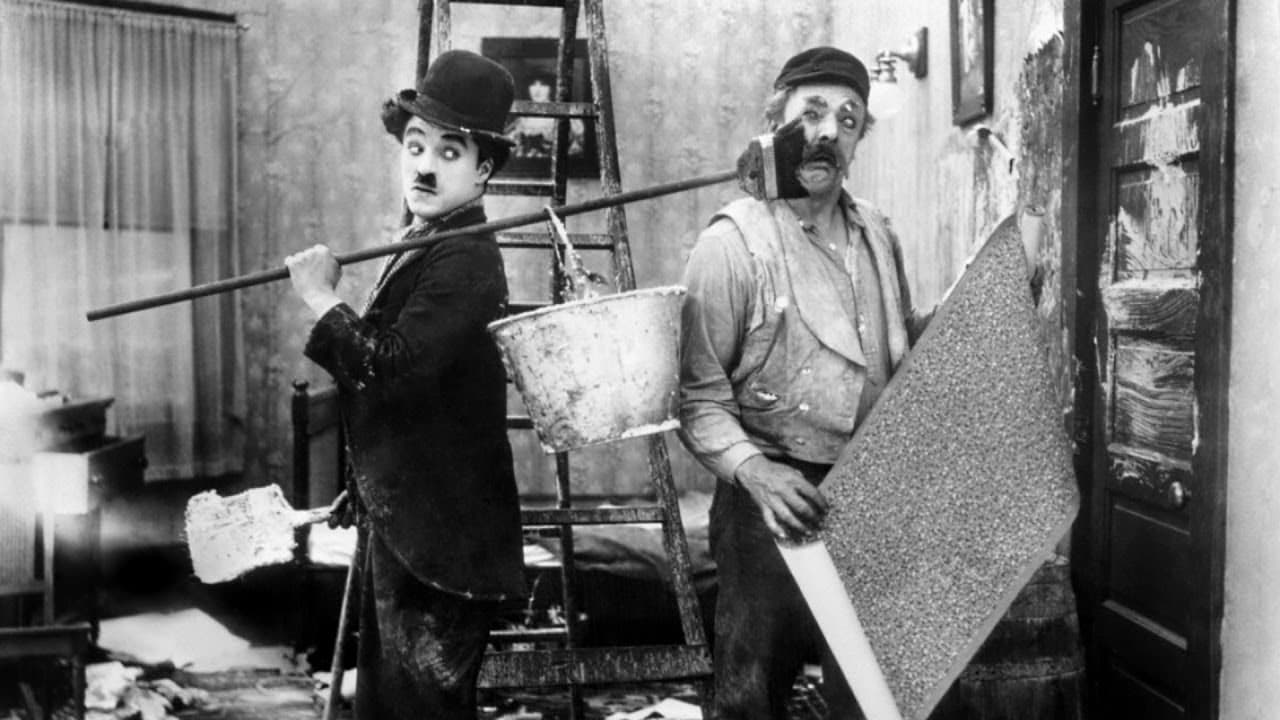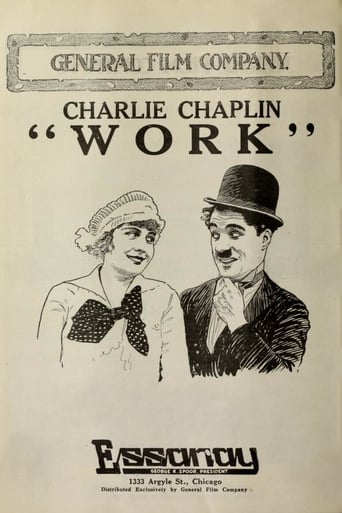Smartorhypo
Highly Overrated But Still Good
Grimossfer
Clever and entertaining enough to recommend even to members of the 1%
Salubfoto
It's an amazing and heartbreaking story.
Rio Hayward
All of these films share one commonality, that being a kind of emotional center that humanizes a cast of monsters.
Horst in Translation (filmreviews@web.de)
"Work" is a black-and-white silent short film from 1915, so this one is another work directed by and starring Charlie Chaplin from over a century already. You won't find too many of his regular cast members in here this time. The version I watched ran for 25 minutes roughly, but I see here on imdb that versions of 31 and even 41 minutes exist apparently too. Not sure if some scenes were lost, but I think it's rather all about the frames per second. Anyway, it's not important anyway as regardless of how long it is, simply too much happens in here for the film to feel authentic and realistic and more than shoving us one (not so) funny scene in the face. In this one Charlie's shenanigans, but also the other characters' messing up in their rage mostly have an impact on that and maybe a guilt too. It's a long and (in the truest sense of the word) messy road to that as a lot of dirty stuff happens in here (but not in the sexual sense obviously, hey these are the 10s, kissing was controversial back then already). Overall, I think the script was the main problem here as Chaplin and also others are far better actors and the constant shots at comedy made it difficult for the cast to shine or the movie to deliver in any genre as the chance was definitely there, but it almost seemed like they did not want it to happen. The slapstick just gets too much at some point, which is no surprise really as the mere quantity of jokes almost rules out that all, or even most, of them could have been convincing. One of the more known Chaplin shorts, not most known probably, but definitely not one of the best. Only watch if you really love Him (then you will also understand the capitalized H). I give this one a thumbs-down though.
Prismark10
Work is a rather messy Chaplin short but feels overlong as some of the situations drag on.Chaplin plays a workman on his way to decorate a house, we see him pulling his boss on a cart who also whips him, there are several scenes where he crosses a train track just before the train passes through and then he struggles to get up a hill. In one scene the boss invites a friend to hop on the cart. You can see Chaplin is already taking a stand against exploitative capitalism already!Once they arrive at the middle class house, there is all kinds of slapstick as they try to wallpaper the house, there is an exploding stove, Chaplin takes a shine to the maid, and the householder's wife is visited by her secret lover.This is the first Chaplin short I have seen in some years, they just do not get repeated as often as they used to be on television. In Work Chaplin has not found his 'tramp' persona but there is some good skills used to for the slapstick but it gets too repetitive.
Steffi_P
Charlie Chaplin, in what was probably his most anarchic phase, was now basing many of his short comedies around a normal, "straight" setting, into which his little tramp character could blunder, causing mayhem as he went. Work is probably the most carefully constructed and effective in this respect.The picture begins with a couple of extremely regular shots establishing the house in which most of the action is going to take place, and introducing us to its prim middle-class residents. Everything appears very formal, all composed of straight lines and neat areas of black and white. We then suddenly cut to Charlie chugging down the street with his boss's cart behind him. Everything in this shot has to do with disorder, with wonky telegraph poles, extras cutting across the frame, not to mention the ramshackle contraption the tramp is pulling. When we arrive at the harmonious household, the camera set-ups from the opening shots remain the same, but gradually the tramp's chaos begins to spread. The neatness and formality disappear while the mess and clutter builds up as, one by one, the rooms (and their occupants) are thrown into disarray.Of course, Chaplin's popularity was not just founded on his comical capers. His satirical streak, here in full swing, would have struck a chord with many in his audience. I have certainly had a fair few employers who take after Chaplin's boss, and it's great fun to see this kind of character lampooned. And as in most of Chaplin's shorts there is a heart amidst the havoc, here in the form of the "sad story" scene. Even then, Chaplin wisely keeps the comedy going and stops the moment from getting too serious and saccharine.Work is by no means the most hilarious of the Essanays, and certainly not the best developed in storyline, but on its own terms it is a pure work of genius, and positive proof that Charlie Chaplin was not just a funny little man. When it came to film-making, he knew exactly what he was doing.And last but not least, the all-important statistic – Number of kicks up the arse: 2 (2 against)
raskimono
The first scene of Chaplin in this movie is of him drawing a carriage while his masters sit in the back as he tries to take them up a hill to amusing results. That's all you need to know to appreciate this treatise on work and the pains that man goes to achieve it. We all have to work to pay the bills, but the characters homes he visits in the movie don't have to work, the way he does, that is the hard labor of using one's hands and seem precarious of it. Chaplin loved to spoof the rich or the idle class as they are known. Maybe, he felt being born with a golden spoon is bad. There is nothing wrong with that. It's how one lives with such advantages and disposes of his willed upbringing that castigates the self. But not to Chaplin, who goes on to wreck havoc in a series of set pieces that ends with destruction and a wink to the camera; an act of farewell and goodbye. Is it farewell to work and a hooray for idleness, I cannot say but like a cartoon character who has preyed the deed, he takes us along and makes us laugh, even if I do not agree with his accusations.

